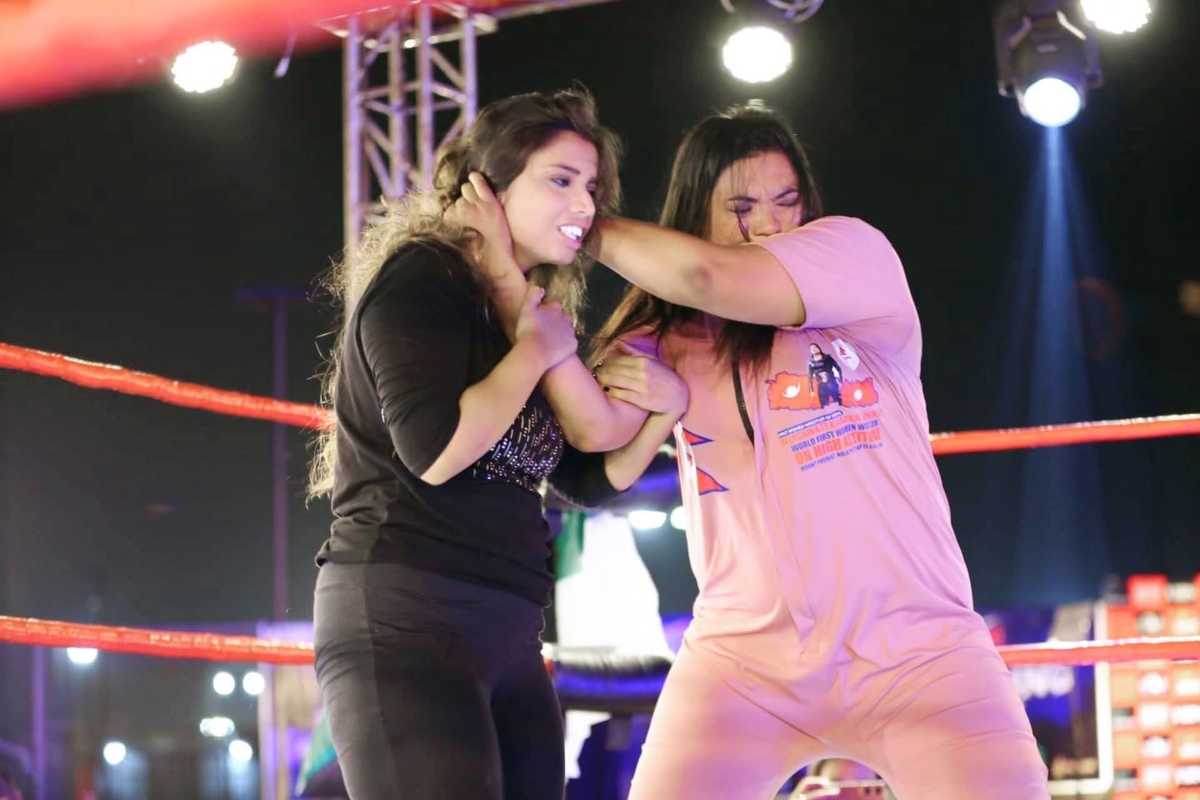Nepal's Bhagwati Khadka paves way for women’s wrestling in Pakistan
Bhagwati’s own career has taken her to Japan, Australia, India, and now Pakistan

Kulsoom Jahan
Sports Correspondent
Kulsoom Jahan is a driven and accomplished professional with a passion for sports, news, storytelling, and in-depth fact-gathering. With eight years of experience in the sports media industry, she has honed her skills in conducting insightful interviews, crafting compelling narratives, and delivering high-quality content. Known for her ability to meet deadlines well in advance, Kulsoom is meticulous in her attention to both video and audio details, ensuring excellence in every project she undertakes. Her dedication and expertise make her a valuable asset in the ever-evolving world of sports media.

Nepal’s Bhagwati Khadka (R) faced Pakistan’s Begisa during a bout in Karachi.
Nukta
The air inside the packed hall in Karachi was electric. Cheers bounced off the walls as two women stepped into the wrestling ring — a sight never before witnessed in Pakistan.
For the first time in the nation’s history, a women’s professional wrestling match was about to take place. The crowd, a mix of wrestling enthusiasts, curious onlookers, and families, leaned forward in anticipation.
The milestone moment unfolded during the REW Wrestling event, where Nepal’s Bhagwati Khadka — the country’s first female professional wrestler — faced Pakistan’s Begisa, who had been specially trained for this debut bout.
Dressed in vibrant gear and radiating quiet confidence, Bhagwati was no stranger to moments that change the course of history. When the bell rang, she moved with a fluid mix of speed, strength, and precision. The contest was short but intense — a demonstration of skill that ended with Bhagwati securing a decisive victory.
But for her, the win was only part of the story. “They told me women don’t wrestle in Pakistan. That only made me want to come here even more,” she said, smiling as the cheers washed over her. This was more than a sports victory — it was a statement.
From village dreams to global arenas
Bhagwati’s journey began far from the bright lights of stadiums, in the rugged landscapes of Nepal. As a child, she was drawn to the arts — acting in local films, singing on stage — dreaming of performing before audiences. But her natural athleticism and fierce competitive spirit eventually pulled her toward sport.
She started with karate, boxing, and weightlifting, disciplines that built not only her body but also her mental discipline. Still, wrestling wasn’t on her radar until 2012. That year, she took the leap into professional wrestling — a step that was, in her words, “both terrifying and exhilarating.”
Her turning point came when she met Himalaya Tiger, a fellow Nepali professional wrestler. After a month of intense training under his guidance, she found herself standing in the ring opposite a famous American wrestler — an experience she still calls “unforgettable and life-changing.”
The path was far from easy. During her college years, she juggled acting roles and wrestling training, often without a steady income. Family support was limited; her ambitions were unconventional in a society where wrestling was seen as a male domain. She credits one sister’s unwavering support for keeping her dream alive when financial struggles threatened to end it.
Breaking records
Bhagwati’s career is filled with milestones, but few are as breathtaking as her 2023 achievement in Nepal’s Khumbu region.
At Kala Patthar, at an altitude of 5,644 meters, she organized a women’s wrestling event, setting the record for the highest-altitude women’s wrestling match in history. The feat was recognized by the World Book of Records London.
“Wrestling gave me strength, identity, and the courage to chase my dreams,” she reflected. “I want other women to feel that too.”
This was her second recognition from the record-keeping body, cementing her place as a trailblazer in the sport.
Building a foundation for the future
Determined to pave the way for others, Bhagwati founded the Nepal Women’s Wrestling Foundation. To date, she has trained 119 women and 40 men, many of whom have gone on to compete professionally.
The foundation organizes professional wrestling events every three months, often inviting international wrestlers to compete alongside local talent. These events don’t just entertain — they challenge cultural stereotypes and create space for women in a sport still dominated by men.
Bhagwati’s own career has taken her to Japan, Australia, India, and now Pakistan — each destination adding a new layer to her story as a pioneer.
Why Pakistan was different
Her journey to Karachi began with a conversation with Pakistani wrestler X-Mas Mustafa Ali. He told her there were no female wrestlers in Pakistan and that women, often wearing abayas or burqas, had little exposure to the sport.
“He said female wrestlers weren’t allowed in Pakistan. That made me even more determined to come here and fight,” she recalled.
When she finally stepped into the Karachi ring, the bout with Begisa was more than competition — it was a symbolic crack in a cultural barrier. For the young Pakistani women in the audience, seeing two female athletes in the ring may have been their first glimpse of a possibility they’d never considered.
The other side of the fighter
Away from the ring, Bhagwati is a woman of many talents. She is an actress known for portraying strong, often villainous characters — roles she enjoys for their intensity and challenge. She is also a singer, and during the Karachi event, she performed “Nepali Hami Rahaunla Kahan Nepalai Narhe”, a song that earned her warm applause from the crowd.
Her brief stay in Pakistan was filled with hospitality and connection.
“Pakistan loves and supports Nepali people —I loved the biryani and tea and felt so much warmth here,” she said with a grin. “And Pakistani clothing is beautiful! I bought a kurti and shoes.”
More than a victory
For Bhagwati, winning in Karachi was not simply about adding another title to her name. It was about showing what’s possible when someone refuses to accept “no” as the final answer. Her presence in that ring represented not only her own struggle and triumph but also the untapped potential of countless women in South Asia.
She hopes her appearance in Pakistan sparks a chain reaction — inspiring local organizers to create opportunities for female wrestlers and giving young girls a reason to believe they too can compete.
A fighter’s legacy
Bhagwati Khadka’s journey is one of grit, resilience, and the refusal to be confined by boundaries — whether geographic, cultural, or societal. From being the lone woman in Nepal’s wrestling scene to becoming the pioneer who brought women’s wrestling to Pakistan, she has proved that strength knows no borders.
“I faced struggles, I faced rejection, but I never gave up. Wrestling taught me to keep fighting — in and out of the ring,” she said.
For the young women of Nepal, Pakistan, and beyond, Bhagwati is more than a champion. She is living proof that even in the most male-dominated arenas, there is always space for a fearless fighter willing to step through the ropes.
As the lights dimmed in Karachi and the crowd began to file out, the energy of the night still hung in the air. It was the feeling of history being made — and of doors opening for a future that, just a few years ago, seemed impossible.
If her career so far is any indication, this is not the end of Bhagwati’s story. It’s simply another chapter in a saga that keeps proving one thing: the ring belongs to anyone brave enough to step into it.







Comments
See what people are discussing